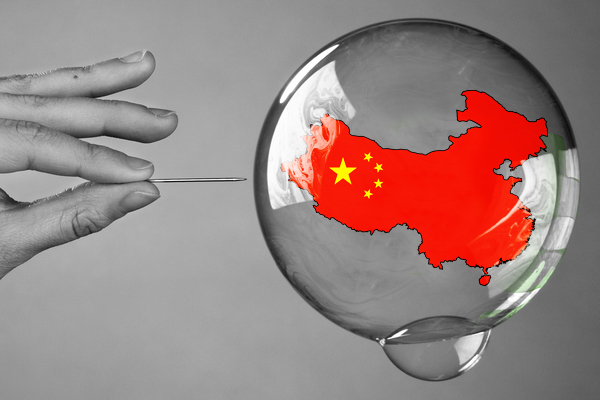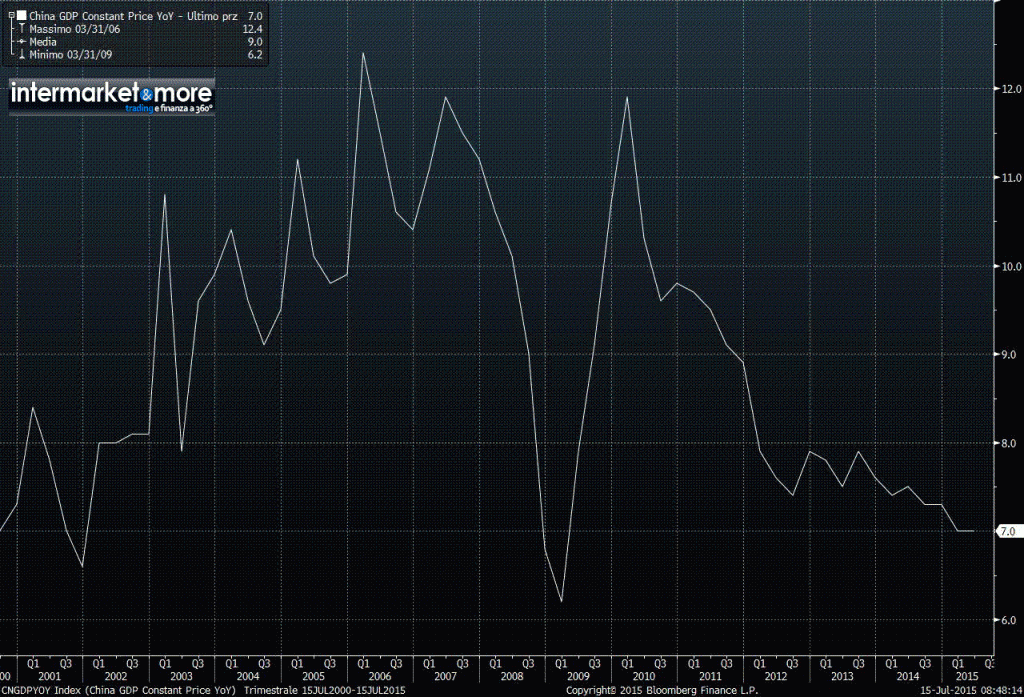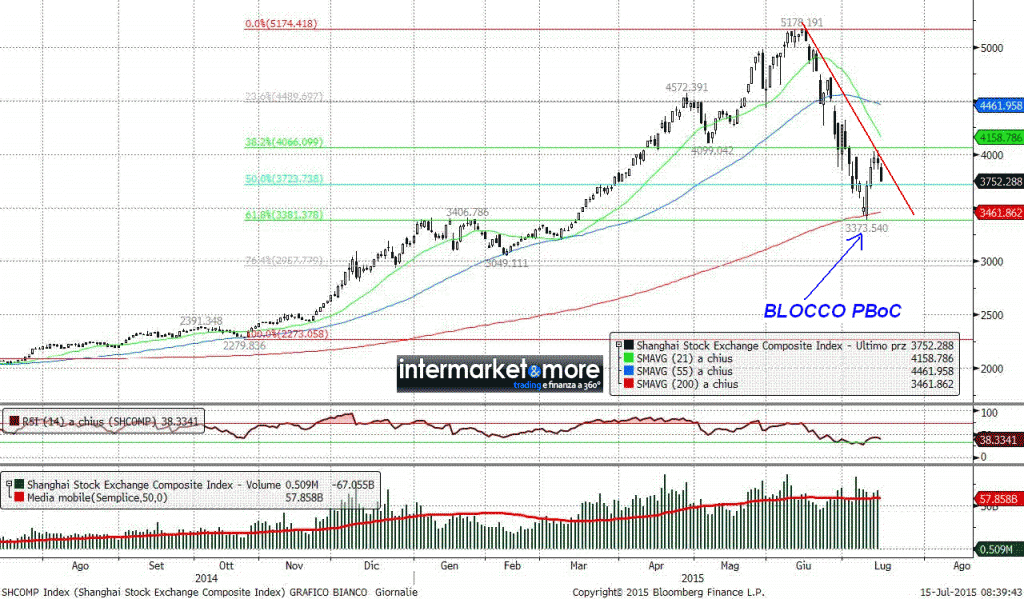in caricamento ...
BOLLA CINESE: il concetto di “libero mercato” è un’altra cosa
 Il misterioso stato cinese continua a sorprendere in tutte le direzioni. Diventa veramente di difficile lettura un quadro dove una borsa, palesemente cara (riguardatevi i post sul mercato cinese CLICCANDO QUI) viene difesa a suon di soldoni persino dalla banca centrale e dal governo cinese. Si fa quindi di tutto per non lasciare sgonfiare la grande bolla speculativa cinese.
Il misterioso stato cinese continua a sorprendere in tutte le direzioni. Diventa veramente di difficile lettura un quadro dove una borsa, palesemente cara (riguardatevi i post sul mercato cinese CLICCANDO QUI) viene difesa a suon di soldoni persino dalla banca centrale e dal governo cinese. Si fa quindi di tutto per non lasciare sgonfiare la grande bolla speculativa cinese.
Ma oltre alle drammatiche montagne russe della speculazione, ci sono anche dei dati migliori delle attese. Sembra infatti (coi cinesi il condizionale è sempre d’obbligo) che il Pil sia cresciuto del 7% su base trimestrale, meglio del 6.8% atteso.
PIL Cina: meglio delle attese
 La cosa che pare palese è che l’economia cinese, senza gli stimoli monetari della PBoC sono regge e non cresce.
La cosa che pare palese è che l’economia cinese, senza gli stimoli monetari della PBoC sono regge e non cresce.
Fino a quando questi stimoli contribuiranno a “drogare”il mercato? La storia USA insegna: può essere anche un percorso molto lungo. C’è però una differenza, qua stiamo parlando di piazze dove il concetto di “libero mercato” è un principio relativo e la normativa viene interpretata ad uso e consumo delle istituzioni.
Oggi leggevo forti critiche da parte di economisti e gestori sul comportamento avuto dalle istituzioni proprio per bloccare il crollo dei listini asiatici nei giorni scorsi.
Il crollo apparentemente inarrestabile della borsa cinese, iniziato lo scorso 12 giugno, ha portato le autorità a sospendere dalle contrattazioni oltre 1.200 titoli. […] La bolla della borsa cinese, che in 12 mesi era cresciuta di oltre il 150% fino al picco del 12 giugno scorso, è scoppiata. In particolare i titoli sospesi sono 1.243 (il 43% del totale) della borsa di Shanghai e quella di Shenzen. Il totale dei titoli sospesi è pari ad un terzo della capitalizzazione del mercato cinese. L’autorità cinese che regola il mercato borsistico (China Securities Regulatory Commission) ritiene che sui mercati stia prevalendo «il panico». […]La Banca Centrale cinese ha annunciato che garantirà la liquidità necessaria per stabilizzare i mercati borsistici cinesi e per scongiurare rischi sistemici. (Source)
Anche sui giornali locali iniziano ad uscire forti dubbi sull’efficacia di queste iniziative defensive anche perchè come possono gli investitori internazionali “fidarsi” della Cina?
Grafico Shanghai Index
 Mi incuriosisce molto il comportamento del grafico dello Shanghai index.
Mi incuriosisce molto il comportamento del grafico dello Shanghai index.
Dopo i picchi registrati a metà giugno, abbiamo visto una correzione del 61.8% dalla partenza del super rally. E proprio quel livello corrisponde con la media mobile a 200 giorni. Rimbalzo comunque corposo che arriva fino al 38.2% sempre di Fibonacci per poi tornare a correggere. Orta il grafico risulta chiaramente impostato al ribasso. Ma in questo contesto, sia in chiave long che short, come potersi fidare solo di un grafico quando dietro c’è una banca centrale che è disposta a spendere l’inverosimile per difendere l’assurda bolla?
Riproduzione riservata
STAY TUNED!
(Clicca qui per ulteriori dettagli)
Segui @intermarketblog
(Se trovi interessante i contenuti di questo articolo, condividilo ai tuoi amici, clicca sulle icone sottostanti, sosterrai lo sviluppo di I&M!). E se lo sostieni con una donazione, di certo non mi offendo…
La nuova guida per i tuoi investimenti. Take a look!
Questo post non è da considerare come un’offerta o una sollecitazione all’acquisto. Informati presso il tuo consulente di fiducia. Se non ce l’hai o se non ti fidi più di lui,contattami via email (intermarketandmore@gmail.com).
NB: Attenzione! Leggi il disclaimer (a scanso di equivoci!)
Alla faccia dei cinesini mi sto gustando una Bella Bionda ghiacciata.
Alla Salute del blog !!
Tu compreresti qualcosa che hai certezza non possa perdere valore?
With the opening up of capital items and an increasingly internationalized renminbi (RMB), and particularly when the Shanghai Free Trade Zone (SFTZ) begins implementing policies which make investing and financing more convenient, foreign Investors and Financiers will have easier access to RMB.
However, this will increase the risk of RMB speculation by international funds through the SFTZ.
China’s current exchange rate regime, a managed floating exchange system, is adjusted with reference to a currency basket based on market demand, and PBoC conducts timely transactions between the RMB and foreign currencies in the Public market.
When forex capital flows in on a large scale, PBoC buys the foreign currency and introduces RMB into circulation. When large amounts of forex capital flow out, PBoC buys RMB using its foreign currency reserve to inhibit the depreciation of the RMB and the flight of capital.
“The Renminbi off-shore market and cross-border capital flows”
If PBoC fails to regulate in a timely manner or cannot control the situation due to lack of foreign currency reserve, the RMB could see significant depreciation within a short period, causing chaos in the foreign currency market, even triggering a monetary or financial crisis and affecting the development of the entire economy.
With the increasing convertibility of RMB capital items, short-term interest arbitrage may possibly flow into China’s monetary and capital markets – such as stock, bond and foreign exchange markets – where high returns can easily be obtained, forming a temporary false prosperity in bond and foreign currency markets and even the whole economy.
They can exploit legal loopholes to control the market with speculation, or even enlarge the amount of funds by taking advantage of financial derivatives’ leverage effect, which will impact the RMB and capital market.
If the stock index and RMB exchange rate rapidly declined as a result of the shorting mechanism used by international Speculators, the financial system and its stability would be seriously impacted and threatened.
Interest rate liberalization has challenged Commercial Banks, forcing them to adopt a series of measures to off-set the impact brought by the interest rate liberalization. Liability costs are increasing and deposits are draining.
The table
“China banking sector – Commercial Banks under the impact of interests rate liberalization”
shows the deposit interest rates offered by 16 listed Banks as at the end of May 2015.
Although PBoC has allowed financial institutions to take deposits at interest rates 50% above the official benchmark, none of these Banks offers the highest interest rates allowed.
The interest rates offered by the five state-owned Banks are basically at the same level, except for the interest rates offered by China Construction Bank (CCB) for deposits due within one year, which are higher than those offered by the other four.
The deposit interest rates offered by joint stock Commercial Banks are generally higher than those offered by the five State-owned Banks but lower than those offered by Urban Commercial Banks. In addition, the interest rates offered by joint stock Banks are more or less the same.
The deposit interest rates offered by Urban Commercial Banks are higher than those offered by other Banks. Increases in deposit interest rates lead to increasing costs of liability. Bank of Communications (BCM) even recorded negative growth in its deposits taken.
A diversified liability structure can help Banks cope with the pressure brought by the increasing costs of liability.
Commercial Banks’ sources of funds consist of deposits, debt securities issued, due to PBoC, due to Central Banks and other financial institutions, other liabilities, and owner’s equity.
Deposits which belong to passive liabilities have always been the core source of funds of China’s Banks.
With interest rate liberalization, active liabilities have become Commercial Banks’ important sources of funds and an effective means of Financial Management.
Active liabilities include:
l- debt securities issued,
l- amount due to Central Banks,
l- amount due to Banks and other Financial Institutions,
l- other new capital instruments such as agreement deposits.
Surfer © サーファー l All rights reserved






Tu compreresti qualcosa che non hai certezza di poter vendere? Bannare le vendite e congelare mezzo listino darà solo qualche giorno di respiro. Forse neanche